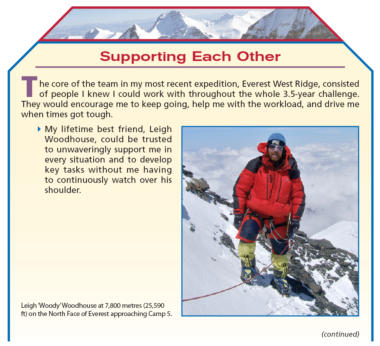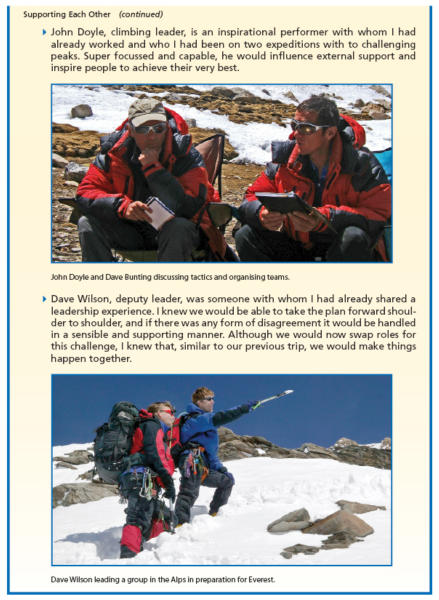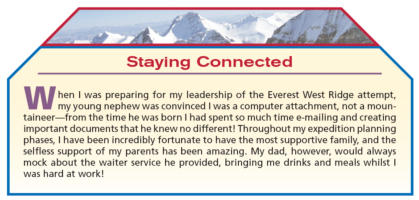Developing leadership takes many steps
This is an excerpt from Mountaineering by Carlton Cooke,Dave Bunting,John O'Hara.
Gaining Support
Gaining support is crucial, and the key is being a good salesperson. You need to map out your vision clearly and gain the confidence of those whose support you want. When trying to gain this support, remember that you don't get a second chance to make a first impression. If you don't get your sales pitch right, that support could be lost forever. If you come up with a well-thought-out expedition that contains groundbreaking aspects, then there is a good chance that everyone will want to be involved and get a piece of the action. It is important to weed out people who may not be helpful, and you must recruit quality, knowledgeable, and enthusiastic support that will help you move forward.
The Team
At the early stages of leading an expedition, you must carefully consider whom you want in the core of your team to help push forward your idea. This includes not just technical performers but a loyal, hardworking, and effective group whom you can always rely on to support you and take your vision to reality. The people in this small group need to share your vision and values, and you need to know them well and trust them implicitly. It helps if you have already shared an experience similar to the expedition you are about to undertake and thus you have seen them under similar pressures. If you haven't had these shared experiences, then you risk being surprised when, under new strains and in alien environments, you both react differently to what is ahead. By employing the right people with the right qualities, you will quickly gain the necessary momentum and they will help you to inspire supporters and other team members alike.


Family and Friends
Volunteering for a big project that is going to take years to plan can result in a single-minded and selfish time in your life, and unless you have no family and friends, you are signing up more people than yourself to the forthcoming project. If you don't have the absolute support of your family and close friends, then it will be a difficult time for you, and it may be too demanding to overcome the stresses and strains placed upon you. I have always thought that when you are single it's much easier because you can be relatively selfish and use your free time to totally immerse yourself in the planning process, but the understanding and support of those close to you can help you achieve so much more. The time required for planning a big project should not be underestimated.
Family and friends should be informed and encouraged to get involved. Organise team meets aimed at gathering families and friends so that they become involved in at least the social network associated with the expedition. They can put names to faces and get to know the people with whom you are working so closely and in whom you are investing your trust for extreme undertakings. This widens the expedition family-and-friends network. Some family and friends can also help organise social and fund-raising events, relieving pressure from the leaders in delivering these important activities. The information you give your family and friends about the expedition should be thought out carefully. Too much detail, particularly if they are not experienced or knowledgeable about the activity, could make them unnecessarily worried.
Patrons
The importance of a quality core team and support from your family and close friends cannot be underestimated, but the power of influential supporters who are well positioned to gain sponsorship or cut through red tape is also crucial. Expedition patrons have long offered support and guidance for bigger expeditions, and their contacts and knowhow can prove crucial if finances are not going as planned or an in-country embassy is being difficult. It is, however, a balancing act because you require people who are powerful and carry influence but at the same time are not so busy that they can't offer you their time.
Retired members of the House of Lords or retired mountaineers are often signed up to these roles, and from my experience, they are worth their weight in gold. In addition, a guiding and advisory committee can be invaluable when developing big projects.
Sponsors or Partners
I have been involved in a number of expeditions where gaining sponsorship was critical to getting sufficient finances and logistical support to make the project happen. To gain support, you need to consider what companies and organisations are looking for. Here are a few ideas.
Achieving a First Being able to suggest that your project is a first and also is high risk is very attractive to companies. Many British companies still have great pride in supporting exciting ventures that may see their flag planted alongside the Union Flag in some untrodden ground, thus producing media attention. In addition, there is a big adrenaline junkie culture that captures the eye of the media, so if you can suggest that the risks are high and the chances of success are slim but you have the right team to do it, often you can gain support. Aiming to succeed in the face of adversity will also gain media attention.
Development Undertaking a high-level, high-risk venture requires top performers who know what they are doing and are able to deal with the difficulties that will be faced. Always opting for a team of out-and-out gladiators is not a good idea, however. Taking along some relative novices and intermediates will also attract support, and it will help develop the next generation of high-performance mountaineers. Given enough time to train and prepare, people with the right attitude will soon pick up the skills. I have seen many people quickly advance to the required level when they have the right physical attributes, mindset, and guidance.
Inclusivity Similar to encouraging an ethos of development, it is also important to step back and look at the combination of people in your team. Diverse teams are much more attractive to sponsors and supporters because they generate more interest from outside parties and give the project more angles and stories to tell. Young and old, male and female, novice and advanced—all have their benefits when selling your vision. However, as a leader it is important to maintain the balance between inclusivity and the values, beliefs, and attitudes of the team as a whole.
Whomever you get on board, the important thing is that you don't just want a sponsor; you want an expedition partner. This means a much bigger buy-in, including attendance at training meets and social events. If you have pulled together a good team, the partners will become so engrossed in the project that they will end up supporting you above and beyond what you ever thought possible.

Media
The media are not that straightforward in terms of support because they have a job to do, and that is to find out information and sell stories. The best stories are exciting, death defying, and controversial, so the media will always be looking for a slant and may sometimes put you under pressure that you don't need. On the positive side, having a national newspaper or TV channel on board can attract huge sponsorship if pitched right. The expedition leader therefore needs to be clear in defining the shared expectations for media participation in a large-scale expedition. Clarification of responsibility for resources for camera crews and other media team members is important for planning and logistics, but the overall responsibility for the expedition in terms of the nature of the team, journey, objectives, and ethos must remain with the leader.
Smaller expeditions can also benefit from engagement with the media. Local newspapers and regional television are often looking for local stories on people and teams that are undertaking challenges such as expeditions. Contacts made through working with local media can also increase local support and sponsorship, and stories can focus on aspects of development and the journey rather than just headlines about summiting.
Learn more about Mountaineering.
More Excerpts From MountaineeringSHOP

Get the latest insights with regular newsletters, plus periodic product information and special insider offers.
JOIN NOW
Latest Posts
- How do I integrate nutrition education into PE?
- How does the support of friends and family influence physical activity?
- What makes the Physical Best approach unique?
- Strength training gimmicks . . . or not?
- How do vitamins and minerals support our bodies?
- Why do many people have difficulty losing weight?


